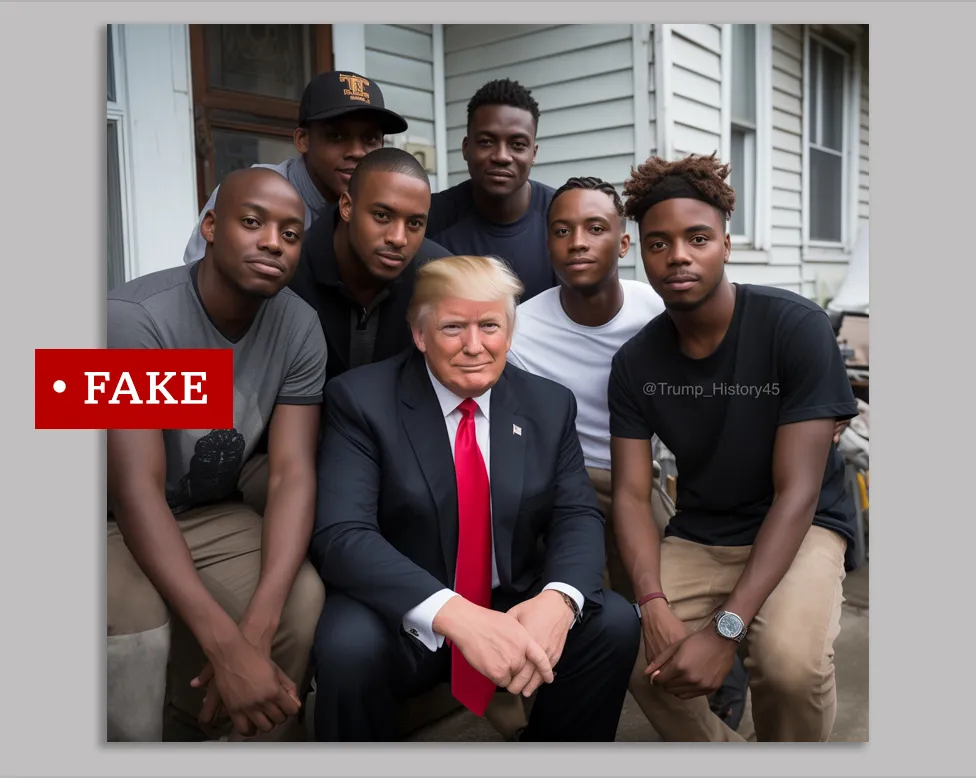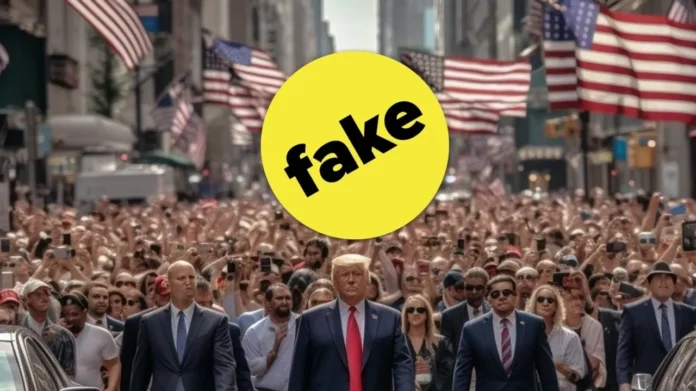AI-generated fake photos of black voters have been produced and circulated by Donald Trump supporters to make an effort to convince African Americans to cast their votes for Republicans.
BBC Primetime found numerous deep fakes representing black people as supporters of the former president.
Black votes were vital to Biden’s presidential election victory in 2020, and Mr. Trump has formally approached them now.
However, there isn’t any proof that these pictures are associated with Mr. Trump’s election campaign.
The founding member of Black Voters Matter, an organization that promotes black voters, stated that the modified photos were promoting a targeted narrative meant to portray Mr. Trump as a well-liked candidate by the black community.
The BBC was informed by one of the images’ designers: “I’m not saying it’s genuine.”
Before the United States presidential election in November, one of the new disinformation trends was the artificial intelligence (AI)-generated phony photos of black Donald Trump fans.
Contrary to the show of foreign influence activities in 2016, the AI-generated images discovered by the BBC have been developed and spread by US voters.
Among them were Mark Kaye and his group at a Florida-based conservative radio program.
They produced a picture showing Donald Trump chuckling and hugging a group of black ladies at an event, which they then posted on Facebook, where Mr Kaye owns a following of more than one million people.
When you look closer, you can see that the skin of everyone is a bit too glossy and that some people’s hands are missing fingers—signifying evidence of artificial intelligence (AI) imagery. At first glimpse, everything looks realistic.
Mr. Kaye informs me that I’m not a photojournalist from his radio room.
He further stated that I am not snapping actual events on the ground. I tell stories.
He included this picture with a story he wrote about black voters endorsing Mr Trump, creating the appearance that these individuals are united in their support of the former president’s bid for the presidency.
Several Facebook commenters thought the artificial intelligence image was authentic.
He stated that I am not saying it is genuine. I’m not pointing out to African American voters, Hey, look, Donald Trump was at the gathering. See how devoted they are to him!”
It is the voter, not the post, who is at fault if someone votes in favor of one candidate based only on a picture they saw on a Facebook page.
The BBC investigation uncovered another frequently seen AI image that pretends to show Mr Trump standing on a front porch with black voters. It was first uploaded by a fake account that creates pictures of the former president. However, it only went viral once it was re-posted with a fresh caption that made up the story that he had broken from his motorcade to see these folks.
We identified Shaggy, the account’s creator, as a devoted Trump supporter residing in Michigan.

According to statements he posted to the BBC on social media, “My posts are attracting countless beautiful kind-hearted Christian admirers.”
He blocked me when I attempted to ask him questions about the AI-generated image. More than 1.3 million individuals have viewed his message, according to social media platform X. While several individuals pointed this out, others appeared to think the image was authentic.
I was unable to find any similarly altered photos of Joe Biden meeting members of a certain voter group. The president is frequently portrayed in AI photos by himself or among other world leaders like Russian President Vladimir Putin or Barack Obama, the previous president of the United States.
While supporters make some, others are by opponents.
The Democratic rivals fell prey to an artificial intelligence (AI) impersonation in January.
A prerecorded voicemail apparently from the president encouraged listeners to avoid the presidential primary in New Hampshire. Acknowledging responsibility, a supporter of the Democratic Party stated that he wished to highlight the possibility of technology abuse.
Black Voters Matter founding member Cliff Albright claimed that similar to the 2020 election, there seemed to be a return of disinformation strategies aimed at the black community.
According to him, there have been recorded attempts to spread false information to black communities yet again, particularly to young black voters.
I present the AI-generated images to him at his Atlanta, Georgia, office. Atlanta is a crucial battleground state for the election, and shifting even a small portion of the total black vote from Mr. Biden to Mr. Trump might have a significant impact.
According to a recent poll by the newspaper The New York Times and Sienna College, 71% of black voters in six important swing states would choose Joe Biden in 2024—a sharp decline from the 92% of them nationwide who supported him in the previous election and helped him achieve the White House.
According to Mr Albright, the phoney photos fit into an “extremely intentional narrative” that conservatives are pushing to win over black votes, from the presidential campaign of Donald Trump to internet influencers. They are focusing especially on young black men because they are believed to be more likely to support Donald Trump compared to black women.
The primary political action organization supporting Trump, MAGA Inc., is scheduled to begin a promotional effort on Monday aimed at black voters in the states of Georgia, Michigan, and Pennsylvania.
Voters like Douglas, an Atlanta cab driver, are the target audience.
Douglas stated that he was primarily concerned about immigrants and the financial system, two subjects on which he believed Trump was more intent. He claimed since he had been fed up with politics, Democratic argumentation about Trump’s danger to freedom would not encourage him to cast a ballot.
While the United States economy is performing well overall, some voters, like Douglas, feel that their situation has yet to improve because they have also experienced a crisis related to rising living expenses.
How did he feel about the AI-created picture of Trump surrounded by black voters on a front porch? He thought it was real when I displayed it for him for the first time. He claimed that it reaffirmed his belief—which is supported by a few other black people who know—that Trump is a community supporter.
I later admitted that it was a phony.
He said, ” This is the thing regarding social media, unfortunately. It is quite simple to mislead people.”
Since Donald Trump emerged victorious in the 2016 US presidential election, disinformation strategies have changed. At the time, hostile foreign countries like Russia were known to have attempted, through networks of fictitious accounts, to foment conflict and spread certain beliefs.
The focus in 2020 was on domestic misinformation, especially stories claiming that the United States presidential election was manipulated. These stories were widely circulated on social media by Americans and supported by President Trump as well as other Republican legislatures.
Experts warn against a risky mix of the two in 2024.
Ben Nimmo, who was in charge of Meta, the company that owns Facebook and Instagram, until last month, stated that the lack of clarity these kinds of fakes generate also creates new routes for foreign countries to influence elections.
In 2024, everyone with a sizable following should begin considering how they will screen the content that is provided to them. How can I ensure that I don’t unintentionally participate in an effort to influence foreign policy? He stated.
Because it becomes more difficult to grow the audience in this way, Mr Nimmo claimed that as social media platforms viewers and platforms are becoming more proficient at spotting phoney automated accounts, “the activities try to incorporate real people” in order to spread controversial or false material.
He defined that their best option is to work with an influencer as somebody with a sizable social media following to try and get their content.
Mr Nimmo expressed concern that these individuals, who would be keen to spread false material to their pre-existing audiences, might end up acting as “unintentional channels” for foreign influence activities in 2024.
According to him, these activities share content with people indirectly or directly, encouraging them to submit it directly so that it has originated from an actual American voter.
Every significant social media platform has protocols in place to deal with possible influence operations, and some have taken new steps to address AI-generated content during elections. One of them is Meta, the company that owns Facebook and Instagram.
This year, prominent politicians from all across the globe have also drawn attention to the dangers of content created by AI.
The US Capitol disturbance on January 6th was caused by stories regarding the presidential election in 2020 being fraudulent, which were circulated online using memes, straightforward postings, and algorithms rather than artificial intelligence (AI)-generated visuals or videos. These stories were spread without any supporting proof.
Once again, political activists and instigators have access to an entirely new set of instruments that have the potential to worsen tensions.





